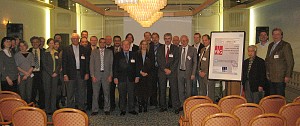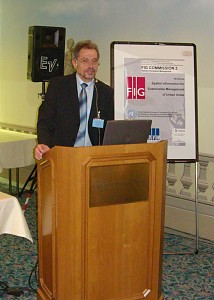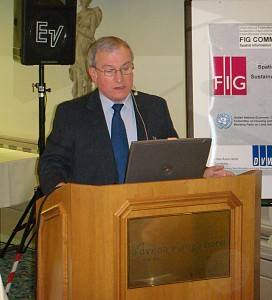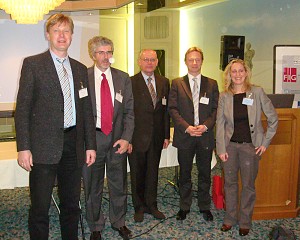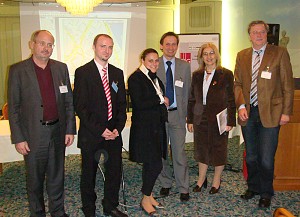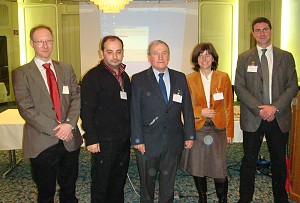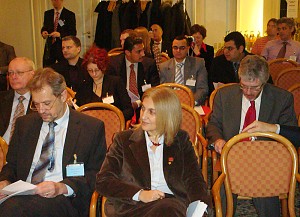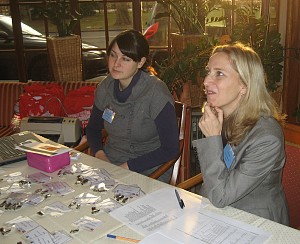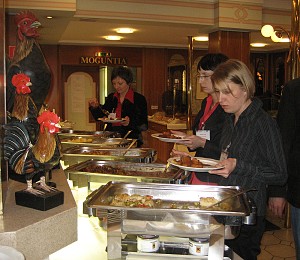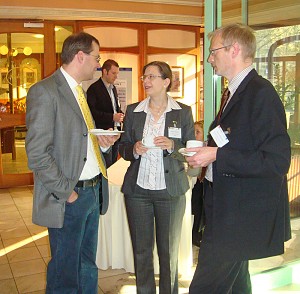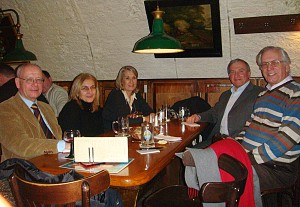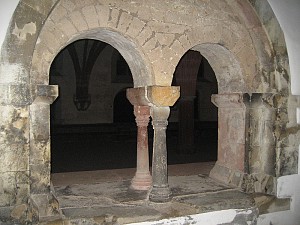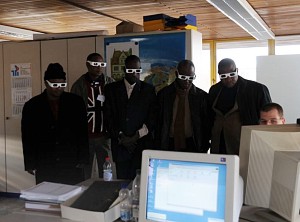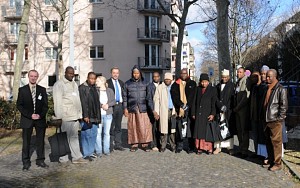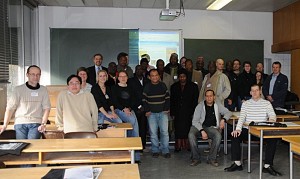FIG Commission 3 Workshop on “Spatial Information for
Management of Sustainable Urban Areas”
Mainz, Germany, 2-4 February 2009
|
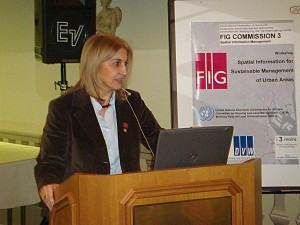
Dr.
Chryssy Potsiou, Chair of FIG Commission 3 making her
opening address.
|
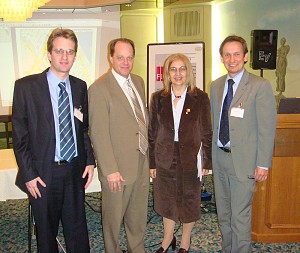
Ariel Ivanier, UNECE WPLA (on the left) with
Steven
Nystrom, Dr. Chryssy Potsiou and Dr. Jens Riecken,
Vice President of DVW. |
The 2009 Workshop and Annual Meeting of FIG Commission 3 on “Spatial
Information for Management of Sustainable Urban Areas” took place in
Mainz, Germany, from 2nd to 4th February 2009. Significant improvements in
technology and science and globalization combined with the major social and
economic changes have rendered rapid urbanization as the phenomenon of our
times. Although it can be seen as an indicator of economic growth, current
urbanization rates have often caused several managerial problems which are
related to unplanned development, often squatting on private or public land,
and the lack of basic services such as fresh water and energy supply,
transportation, waste treatment and management, environmental pollution, and
crime. It is a challenge of our time to achieve good governance, efficient
and transparent administration, and sustainable urban growth.
FIG Commission 3, with an acknowledgement of its responsibility to serve
society, follows major social changes and has developed its four year work
plan and has focused annual workshops on investigating the problems that are
related to the current urban population growth and on identifying the
appropriate land tools for good governance.
In the 2007 scoping Workshop in Sounio, we first addressed the urgent
social and accompanying technical and legal aspects related to the emerging
informal settlements as a result of rapid urban growth, and we all agreed
that access to land, legal and social integration of informal settlers is a
fundamental human right. Legalization, land privatization and affordable
housing provision for low and middle income families were among the main
land tools suggested during that workshop.
In the 2008 Workshop in Valencia, we added to our agenda the important
subject of environmental protection, and we agreed that regulations on
private rights in the use of land in terms of air, soil, and water pollution
must be accepted and applied by all market participants through
participatory democratic procedures. All must share the costs of the natural
resources they consume, through a flexible and market-oriented planning
tool. Current technical developments allow for automatic procedures in
environmental monitoring and informal development detection.
In the 2009 Workshop in Mainz, with a global economy facing its worst
recession in decades, new aspects related to a restricted credit-financed
economic activity, increased unemployment and a shortage of affordable
housing are introduced into urban management. We realized that we live in
economically challenging times and an upturn may only occur in a 3 to 4 year
timeframe. The difference from past economic crises is that the current one
is global and this is an emergency situation for humanity. However, today
more reliable spatial information related to social/legal, environmental and
economic aspects exists, and advanced tools are provided for urban
information capturing and integration (various types of sensors, geoportals,
etc) that allow us to deal with the emerging problems more efficiently. That
is an optimistic conclusion derived from several presentations in the
Workshop. It was identified, though, that many of the surveying and building
regulations in countries are too rigid, expensive and outdated. This leads
to the suppression of innovation in approaches, products and services, and
it hinders the activity of the private sector. It also adds a considerable
and often unnecessary financial overhead to the administration and raises
the question of how appropriate the government institutional arrangements
are in this modern age, especially since such arrangements were designed 60
years ago and have not fundamentally changed. Several papers identified the
enormous scale and expansion of slums and/or informal developments in urban
areas. In Cairo for example a recent survey, presented at the Workshop,
estimated that the problem is five times the size of the official figures.
It seams that the biggest urban challenge today is finding and applying
effective solutions to the informal development explosion in our cities.
This is a priority for Commission 3 and should also be a priority for FIG.
FIG Commission 3 delegates, committed to the principles of cooperation
and respect for each others’ knowledge and experience, worked together
towards improving the tools.
Organization
This Workshop was organized and sponsored by the German Association of
Surveying - Society for Geodesy, Geoinformation and Land Management (DVW)
and the Institute for Spatial Information and Surveying Technology of the
Mainz University of Applied Sciences, and was under the aegis of EARSeL,
UNECE WPLA, Lantmäteriet, and the Appraisal Institute, USA. Mr Makis
Apostolatos, FIG Commission 3 Vice Chair of Administration, has again
offered his experience and assistance in organizing this Workshop.
The technical program included the opening session, 9 technical sessions,
and the closing session; in total 55 papers were presented. In total 73
participants had registered to the workshop coming from 24 countries:
Afghanistan 1, Austria 1, Azerbaijan 1, Canada 1, Cyprus 2, Egypt 3, France
2, Germany 20, Greece 9, Iran 1, Israel 2, Japan 1, Kenya 1, Lebanon 1,
Montenegro 1, Netherlands 1, Nigeria 12, Poland 5, Spain 1, Sweden 1, Turkey
1, UK 2, UNECE WPLA 2, USA 1. FIG Vice President Prof. Dr. Dalal Alnaggar,
invited keynote speaker, could not enter the country due to visa problems.
In addition, twelve registered African delegates due to visa delays arrived
on the 13th of February, so a 2-day follow-up summary of the workshop was
organized by the LOC specifically for them.
Commission 3 delegates and the workshop’s participants were welcomed by
the head of the local organizing committee Prof. Dr.-Ing. Hartmut Mueller,
co-chair of WG 3.2, and the chair of FIG Commission 3 Dr. Chryssy A.
Potsiou. The keynote speaker of the opening session was the Vice
President of DVW Dr.-Ing. Jens Riecken, who spoke on “Organizational
Developments in Spatial Information Management and SDI”. This year
again, the majority of the speakers in the FIG Commission 3 Workshop were
invited speakers. Among other invited national and international speakers
were: Mr. Peter Creuzer, Chair of UNECE WPLA, who spoke on “Sustainable
land management and spatial planning - The WPLA Approach” and Mr. Ariel Ivanier, Secretary of UNECE WPLA, who spoke on “The UNECE WPLA
activities”; Dr. Mathias Hofrén from Lantmäteriet, who spoke on :
“The Value of Using Information Collected for Real Property Taxation, for
Valuation, Granting Loans and Other Purposes in Sweden”; Mr. Steven
L. Nystrom from the Appraisal Institute, USA, who spoke on: “Real
Estate and its Relation to the Financial Crisis in the United States”;
Mr. Heinz Koenig, who represented the former FIG Commission 3 chair
Mr. Gerhard Muggenhuber from BEV, and spoke on “Spatial
Information for Urban Areas. Case study: Vienna”; Prof. Dr. Monika
Sester, who spoke on: “The Potential of Geosensor Networks for
Sustainable Management of Urban Areas”; Prof. Ayman Habib: “Integration
of Photogrammetric and LIDAR Data for Accurate Reconstruction/Visualization
of Urban Environments”; and Dr.-Ing. Otmar Schuster, who spoke on
“Innovations in the Building and Surveying Scene”; several
distinguished high level administrators representing the German
Administration and the Local Authorities; and distinguished delegates
representing GTZ. This year, the contribution of the private sector was also
significant.
FIG Commission 3 Workshop has once more attracted a number of FIG
academic members and researchers, who have coordinated their academic
research on the Commission 3 selected topics. The optional double blind peer
review of submitted papers was applied for a third year in a Commission 3
workshop. Prof. Yerach Doytsher, Chair Elect of FIG Commission 3, is
responsible for the peer review in Commission 3 workshops. Five papers
received successful peer review for this workshop.
The Workshop’s proceedings, list of participants, and resolutions have
been made available by the LOC on the Workshop’s website:
http://www.i3mainz.fh-mainz.de/FIG-Workshop/. An additional specific
publication of the peer-reviewed papers will be published soon.
The Workshop’s activities were augmented by a series of social events
including lunches at the conference hotel, the Commission 3 dinner partially
sponsored by Commission 3, an impressive wine-tasting and dinner at Eberbach
Monastery, a sight seeing event for accompanying persons, and a closing
cocktail party.
Follow -ups
A very successful additional FIG WG 3.2 activity took place immediately
after the Workshop. On 13th and 14th February 2009 a follow-up meeting took
place at the Mainz FIG Commission 3 Workshop’s location. The Local
Organising Committee and the co-chair of FIG WG 3.2 Prof. Dr.-Ing. Hartmut Mueller provided for a two-day summary of the Workshop to the
Nigerian delegation.
The follow-up meeting was attended by the Honourable Speaker of the
Nigerian Katsina State House of Assembly Mr. Yau Umar Gojo-gojo,
along with twelve of his Housing and Urban Development Committee members. In
the context of summarizing several presentations given by some Workshop
speakers, the similarities and discrepancies between the African and
European Land Administration and Spatial Planning Systems were thoroughly
discussed. In that way, an excellent opportunity was taken to transfer the
Workshop’s results to a delegation of high-level political representatives
of an African developing country.
A follow-up high level expert meeting, with limited number of invited
participants only, is planned to take place in Paris at the end of November
2009. It will be organized by the French delegate in Commission 3 Mr. Rafic Khouri. The purpose of this event is to discuss the emerging
problems in specifically selected Mega cities with distinguished
decision-makers and to finalize the context of the Commission 3 publication
on “Mega cities Management”. This publication will be presented in
the 2010 FIG Conference, in Sydney, Australia.
The next and last workshop of FIG Commission 3 for the period 2007-2010,
will be held in September 2010. More details about the topic and venue will
be announced soon.
Dr. Chryssy A Potsiou
Chair, FIG Commission 3 – Spatial Information Management
Prof. Dr.-Ing. Hartmut Müller
Co-chair of FIG Commission WG 3.2 and Chair of the Organising Committee
Read more:
Picture Gallery
|

























